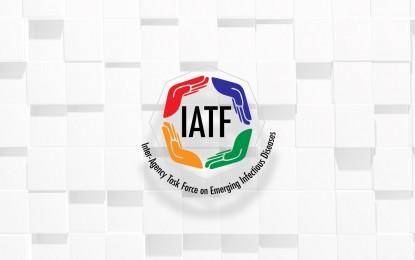
MANILA – The Inter-Agency Task Force for the Management of Emerging Infectious Diseases (IATF-EID) will be reviewing the proposal to allow the operation of provincial buses for the second phase of the resumption of public transport starting June 22.
Presidential Spokesperson Harry Roque explained that although the initial plan of the Department of Transportation (DOTr) is to allow provincial buses under Phase Two, it was decided on the assumption that Metro Manila would have already transitioned to a less strict modified general community quarantine (MGCQ).
Metro Manila and other parts of the country remained under general community quarantine (GCQ) until June 30 due to the increasing number of new coronavirus disease (Covid-19) cases.
“Bantayan po natin at abangan ang anunsiyo ng DOTr kung papayagan nga po ang mga provincial buses sa second phase pagdating po ng 22 June 2020 (Let us monitor and wait for the announcement of the DOTr if provincial buses will be allowed to operate during the second phase starting June 22),” he said in a virtual presser.
Until June 21, only trains and bus augmentation, bus augmentation units, taxis and Transport Network Vehicle Service (TNVS), shuttle services, point-to-point buses, and bicycles are the vehicles allowed to operate.
The second phase is supposed to allow public utility buses (PUBs), modern public utility vehicles (PUVs), and UV Express with limited passenger capacity from June 22-30, 2020.
Resumption of PUJs
Roque said the Land Transportation Franchising and Regulatory Board (LTFRB) is also studying the possibility of allowing the resumption of traditional public utility jeepneys (PUJs) if PUVs would not be enough to ferry passengers to their respective destinations.
“Pinapayagan sa second phase ang modern PUVs po ‘no at kung kukulangin, maaaring payagan ng LTFRB ang traditional jeepneys (Modern PUVs are allowed during the second phase, but the LTFRB might also allow traditional jeepneys), provided, they are road worthy,” he said.
Meanwhile, Roque announced that the DOTr opened on Thursday three new bus routes namely PITX-Sucat, PITX-Naic and PITX-Cavite City. Currently, he said 27 out of 31 bus routes are now open.
There are also 8, 830 TNVS units, 16, 701 taxis at 271 P2P buses operating in 28 P2P routes, he said.
He said that 90 buses currently operate under the MRT 3 Bus Augmentation Program while all railway stations continue to operate.
The DOTr also continues to provide free ride service for healthcare workers, he said.
In a congressional hearing on Tuesday, LTFRB Chairman Martin Delgra told lawmakers that they have identified at least 100 rationalized PUJ routes to be opened if the GCQ will be lifted on June 30.
Locally stranded individuals
As part of government’s vow to send locally stranded individuals (LSIs) back to their respective homes, Roque said data from the Department of the Interior and Local Government (DILG) showed that a total of 34,571 out of the 45,565 LSIs have returned home.
Citing data from the Department of Social Welfare and Development (DSWD), Roque said the agency has spent around PHP2.696 million worth of financial assistance and sleeping and sanitation kits to LSIs as of Wednesday (June 17).
Last week, Malacañang vowed to assist all LSIs following the death of Michelle Silvertino, a woman who died while trying to get a bus ride to Bicol.
Silvertino, who worked as a housemaid in Antipolo, Rizal, reportedly stayed on a footbridge along Edsa in Pasay City for five days after walking from Cubao, Quezon City.
She was found unconscious by a concerned citizen on June 5 and was rushed to the Pasay General Hospital where she was pronounced dead.
LSIs seeking government assistance to contact the DSWD Crisis Intervention Unit at 8734-8635. (PNA)
